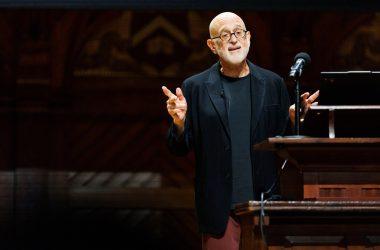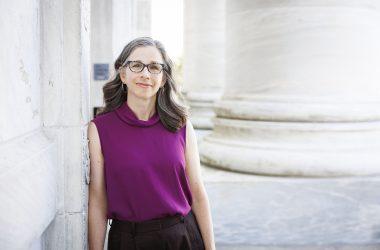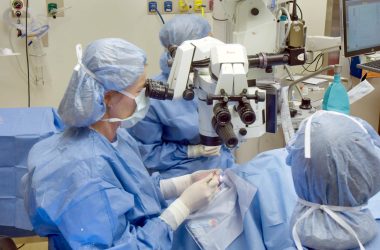Ted Hong (clockwise from top left), Tyler Berzin, Shuji Ogino, Marios Giannakis, Aparna Parikh, and Andrew Chan.
Health
Should colon cancer screening start at 40?
Amid surging early onset rates, Harvard experts say cost, effectiveness, equity must be considered, along with other ways to evaluate
Medical and public health professionals are seeing a worrisome trend of rising early onset rates for certain cancers and wrestling with what the most appropriate response might be.
In April, the U.S. Preventive Services Task Force lowered the recommended age to start breast cancer screening to 40 from 50, citing high mortality and a rising incidence among U.S. women age 40 to 49 for the change. Data showed a 2 percent annual increase in diagnoses from 2015 to 2019.
Colorectal cancer has tracked a similar, perhaps even more worrisome, trajectory in recent years. It has seen an even steeper rise of early onset cases, up 15 percent among those age 40 to 49 between 2000 and 2016. The second deadliest after lung cancer, it kills more people than breast cancer — an estimated 52,550 in 2023.
The Gazette asked colorectal cancer experts at Harvard Medical School-affiliated hospitals whether the colorectal cancer screening age should be lowered to 40 from the current 45.
‘Many of the younger patients are being diagnosed in their late 20s to 30s’
Ted Hong, professor of radiation oncology, HMS; director of the Gastrointestinal Service, Radiation Oncology Department, Mass General Cancer Center
This is a complicated issue. While there is clearly a dramatic rise in colorectal cancer in young patients, it’s not clear that 40 is the correct age. Many of the younger patients are being diagnosed in their late 20s to 30s and moving the screening to 40 may not capture this group of patients, while dramatically increasing cost and utilization. Ultimately, other tests, be it blood-based or stool-based, to direct younger patients at risk to earlier colonoscopy are needed.
‘Early screening involves risks and additional upfront costs’
Tyler Berzin, associate professor of medicine, HMS; director of the Advanced Endoscopy Fellowship program, Beth Israel Deaconess Medical Center
It would be a “not yet” for me right now. In the last couple of decades there has been a nearly 50 percent increase in colorectal cancer diagnoses in individuals under the age of 50. An increase like this can’t be due to genetic factors, which don’t change in the population over that period of time, so the rise in early onset colon cancer is likely related to various environmental and lifestyle risk factors: the types of foods we consume, alcohol use, and obesity, among many other considerations.
Colorectal cancer is now the top cause of cancer death in men under 50 and the second-leading cause in women under 50. Compared to most other types of cancer screening, where the aim is to catch cancers at an early stage, we have a unique advantage in colon cancer screening because we can identify and remove theprecursor lesions — colon polyps — many years before they actually turn cancerous. For this reason, it does make sense to ask the question of whether to recommend earlier screening to identify and remove precancerous polyps before the currently recommended screening age of 45 (for average risk individuals).
There is no doubt that moving the colon cancer screening age to 40 would catch and prevent a few more cancers. But early screening involves risks and additional upfront costs and may shift how we allocate resources. For instance, in some areas of the country with relatively few gastroenterologists, there are already long waits to get in for colonoscopy screening.
The reality is we’re still not doing nearly a good enough job getting most 45-year-olds or even 50-year-olds, screened for colon cancer, and we do a particularly poor job for disadvantaged and vulnerable groups — including the uninsured and underinsured. So changing the colon cancer screening age to 40 can’t be considered in isolation. We have to balance a variety of health care access and cost considerations to determine if it’s the right move for average risk individuals in the U.S.
‘If there was a biomarker to identify risk, this would help us understand who to screen early’
Aparna Parikh, associate professor of medicine, HMS; medical director, Center for Young Adult Colorectal Cancer at Mass General Cancer Center
As an oncologist who sees largely young patients, my bias is to screen earlier. But we have to be mindful of the population-level implications of continuing to lower the screening age. Ideally, we start to understand the drivers and which younger individuals may be prone to develop CRC in order to offer early screening to the right patients. If there was a biomarker to identify risk, this would help us understand who to screen early. Many of my patients are in their 20s and 30s. Expanding the screening eligible age may be a good space for stool- and blood-based screening and risk stratification to get the right people to colonoscopies efficiently.
‘Adherence to screening remains low in the U.S.’
Marios Giannakis, associate professor of medicine, HMS; gastrointestinal oncologist at Dana-Farber Cancer Institute
Early onset colorectal cancer, defined as colorectal cancer diagnosed in individuals younger than 50 years old, is a rising epidemic. In recognition of this, several major organizations and societies have adjusted the recommended screening age for colorectal cancer. For example, the [Preventative Services Task Force] now gives a Grade B recommendation for screening individuals ages 45 to 50 versus a Grade A recommendation for those ages 50-75, and the American Cancer Society (ACS) a qualified recommendation versus a strong recommendation for older individuals. These guidelines instruct physicians to recommend screening to their eligible patients.
It is also true that early onset colorectal cancer affects numerous individuals younger — and sometimes much younger — than age 45. Whether to further reduce the screening age for the general population is a complex decision that these bodies and societies think carefully over, examining not only the incidence of early onset colorectal cancer, but the available resources and cost to society and patients of a more expanded screening program.
It would be a little presumptuous for one — including an expert — physician to assume this role. What has become as clear as the rise in early onset colorectal cancer is that adherence to screening remains low in the U.S. and that underserved populations are particularly vulnerable. Thus, thinking about equitable access to the currently recommended care and advancing the scientific mission of understanding the etiology of early onset colorectal cancer in order to identify those at the highest risk and tailor prevention and screening may well be a more sustainable long-term solution.
‘Only those with the means to afford it would take part’
Shuji Ogino, professor of pathology, HMS; professor of epidemiology, chief of molecular pathological epidemiology in the Department of Pathology, Brigham & Women’s Hospital
It depends. First, we need to have and evaluate more data on comparative effectiveness analyses of costs and benefits of setting universal screening start age at 40 versus 45 years. It is unlikely that a universal colonoscopy start age of 40 years will be cost-effective. Fecal occult blood testing may be more cost-effective, but it has some degree of false-positive findings, which necessitates additional tests (that may be unnecessary to begin with). Thus, we need more research in this area.
It can be possible that, based on genetic and life-course risk factor profiles, screening start age could/should be tailored. However, we lack comprehensive information on effects of various genetic, life-course risk factors and their interactions at this time. Ideally, one can start colonoscopy screening at age 40 years or even younger. However, such a practice will increase health disparities and inequities, as only those with the means to afford it would take part. We could not rely on financially unsustainable universal insurance coverage for universal screening starting at a young age.
‘Focus more on identifying the underlying causes’
Andrew Chan, Daniel K. Podolsky Professor of Medicine, HMS; professor of immunology and infectious diseases, Harvard T.H. Chan School of Public Health; director of cancer epidemiology, Mass General Cancer Center
To address the unprecedented increase in incidence in colorectal cancer diagnosed before the age of 50, it would be tempting to simply lower the age at which we begin screening to 40 years. However, we must also consider the tremendous resources that would need to be devoted to such an effort. Such a major broadening of the eligibility for screening would likely be an insurmountable cost to the healthcare system and divert attention from other important needs. Instead, I would argue that we should focus more on identifying the underlying causes of this rise in early onset cases so that we can focus on efforts to eliminate or reverse them.





